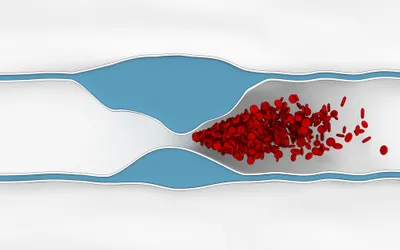An abdominal aortic aneurysm (or AAA) originates anywhere along the aorta, the major artery that runs from you left ventricle (in the heart) all the through to your abdomen. The actual AAA develops into a blood-filled bulge that weakens the walls of the aorta as blood flows with normal pressure. Due to the cramped space and increased pressure, the aorta will eventually rupture, causing severe pain and massive internal bleeding.
Although the exact reason for AAAs is unknown, the following ten factors can influence their development…
1. Poor Diet
Medical research links the hardening of the arteries (a condition referred to as Atherosclerosis) with the development of an abdominal aortic aneurysm due to the accumulation of fat and other substances on the lining of a blood vessel. This fatty build-up is responsible for amplifying the risk of an aneurysm.
2. Smoking
Tobacco from cigarette smoking has also been labeled a culprit when it comes to causing aortic aneurysms. We’re already well aware of the damaging effects of smoking on the heart, but smoking in particular encourages high blood pressure as fatty plaques accrue in your arteries—thus encouraging the aneurysm to develop even more quickly.
3. Infection
Vasculitis, a type of infection that wears away at the blood vessels in the arteries and veins, has been linked to causing abdominal aortic aneurysms to grow. It’s particularly the inflammation caused by the infection that takes root and weakens a portion of the aortic wall.
4. Weakened Aorta Walls
The inflammation and ballooning-effect caused by an abdominal aortic aneurysm that’s increasing in size will ultimately destroy the cells of the aorta walls, resulting in weakness and collapsing of the arteries.
5. Heredity
Family history is often linked to your risk of developing any health issue. And when it comes to abdominal aortic aneurysms, genetic factors (such as birth defects or having siblings with the condition) most definitely weigh in. Caucasian males are also 4 times more likely to develop an AAA compared to women and other ethnical groups.
6. Past Injury
Automobile accidents are also cause for concern, and blunt injury to the abdominal aorta from a car accident has been linked to numerous cases of abdominal aortic aneurysms. This is why prompt diagnosis and surgical following an auto collision are vital to prevent future issues.
7. Associated Diseases
There are a few medical conditions related to the development of an abdominal aortic aneurysm. For instance, those with existing cases of coronary heart disorders or peripheral vascular disease have increased likelihood of developing AAAs.
8. High blood Pressure
Hypertension is often associated with AAAs due to the weakening combination of the slow decline of the protein and elastic fibers of the blood vessel wall—and the increased force of blood flow against the walls of the aorta. Together, these factors weaken portions along the aorta and leave it at risk for infection and an AAA development.
9. Advanced Age
The risk of developing an abdominal aortic aneurysm are heightened as we age—for example, individuals over 60 years of age, who smoke, and eat fatty diets are 18-percent more likely to develop AAAs.
10. Cholesterol
The American Journal of Epidemiology has linked low-density lipoprotein (or LDL) “bad” cholesterol or with an increased risk for abdominal aortic aneurysm. While, on the other hand, studies show that high-density lipoprotein (or HDL) “good” cholesterol is linked to low prevalence of AAAs.













